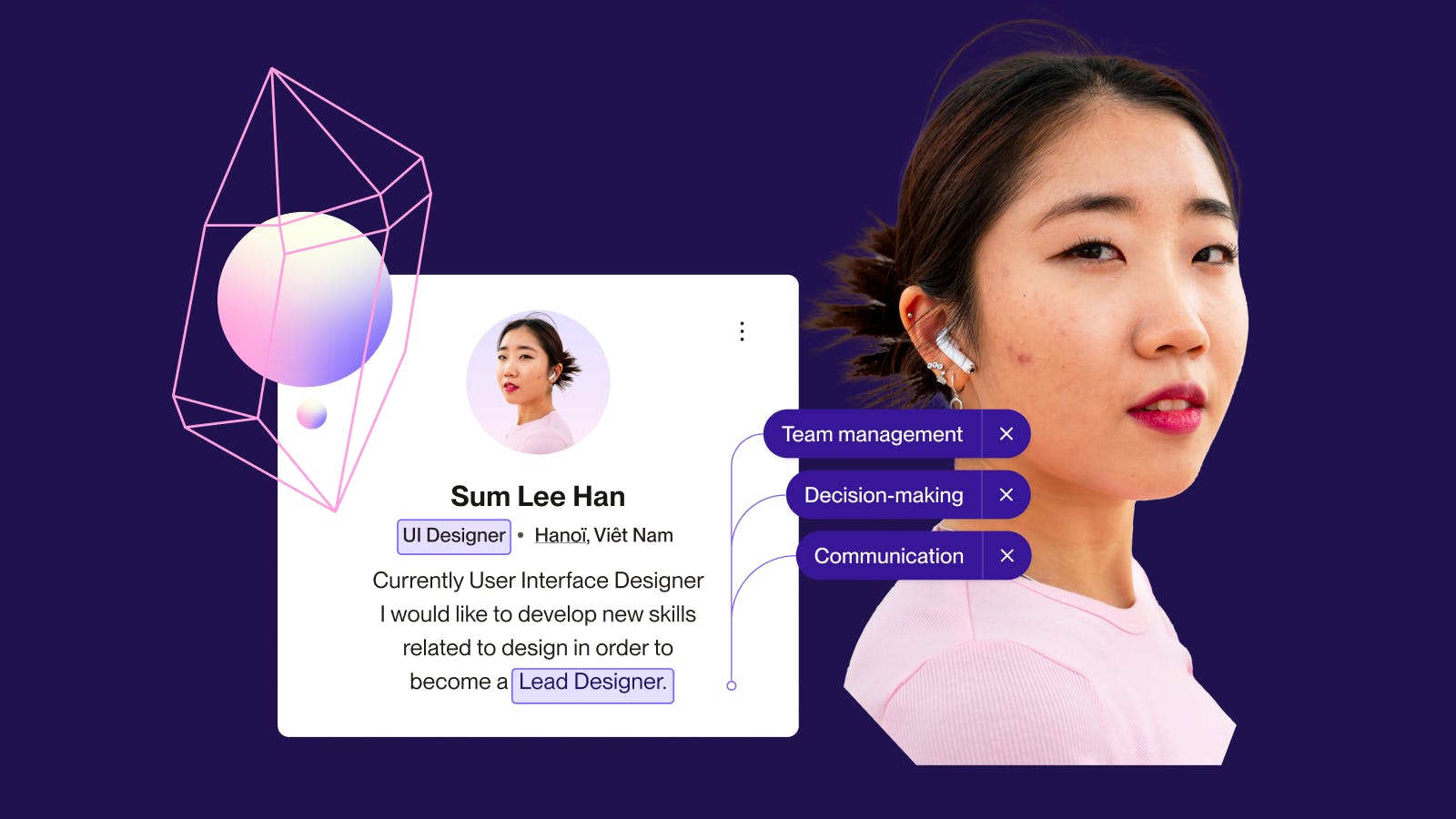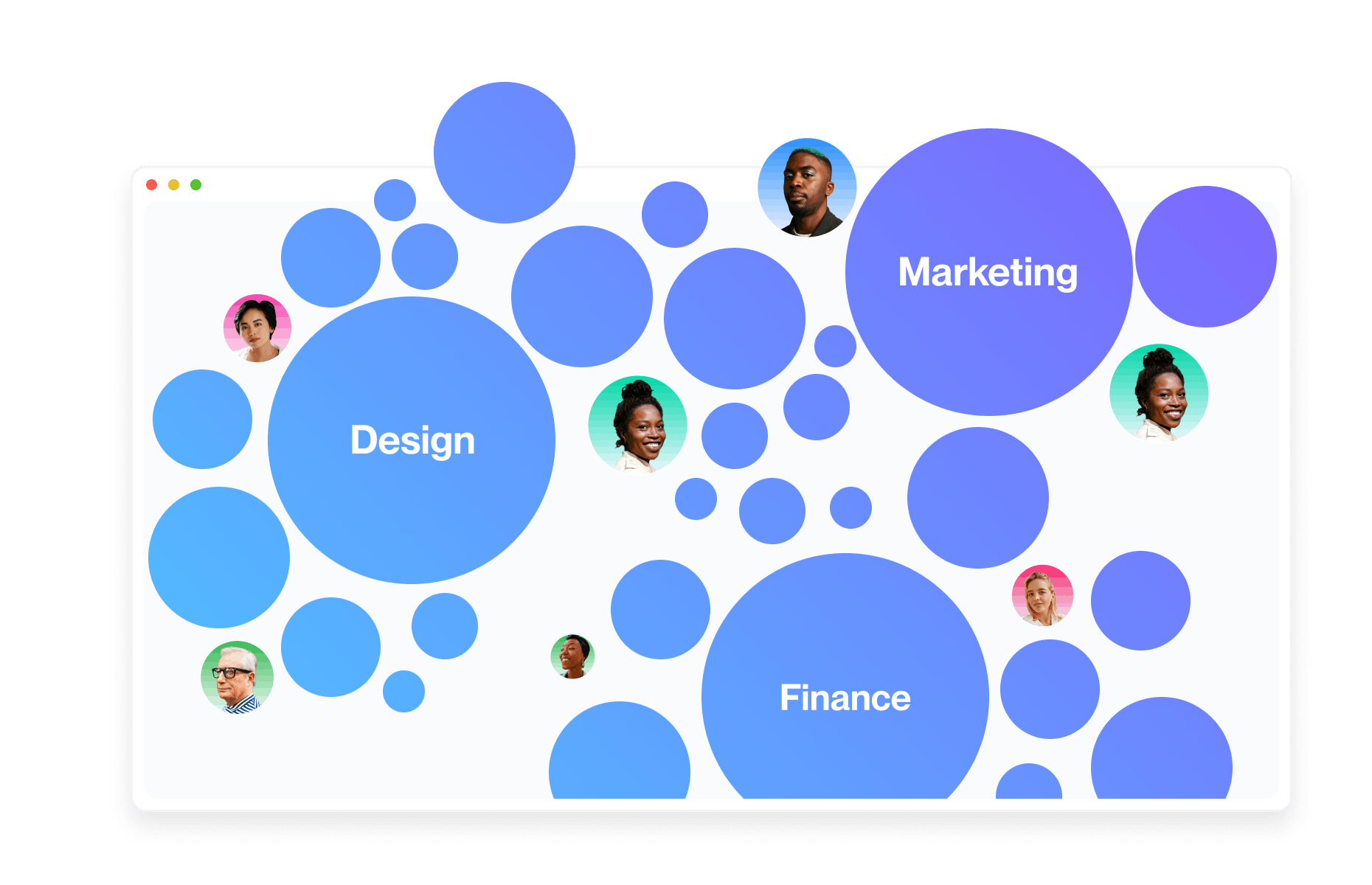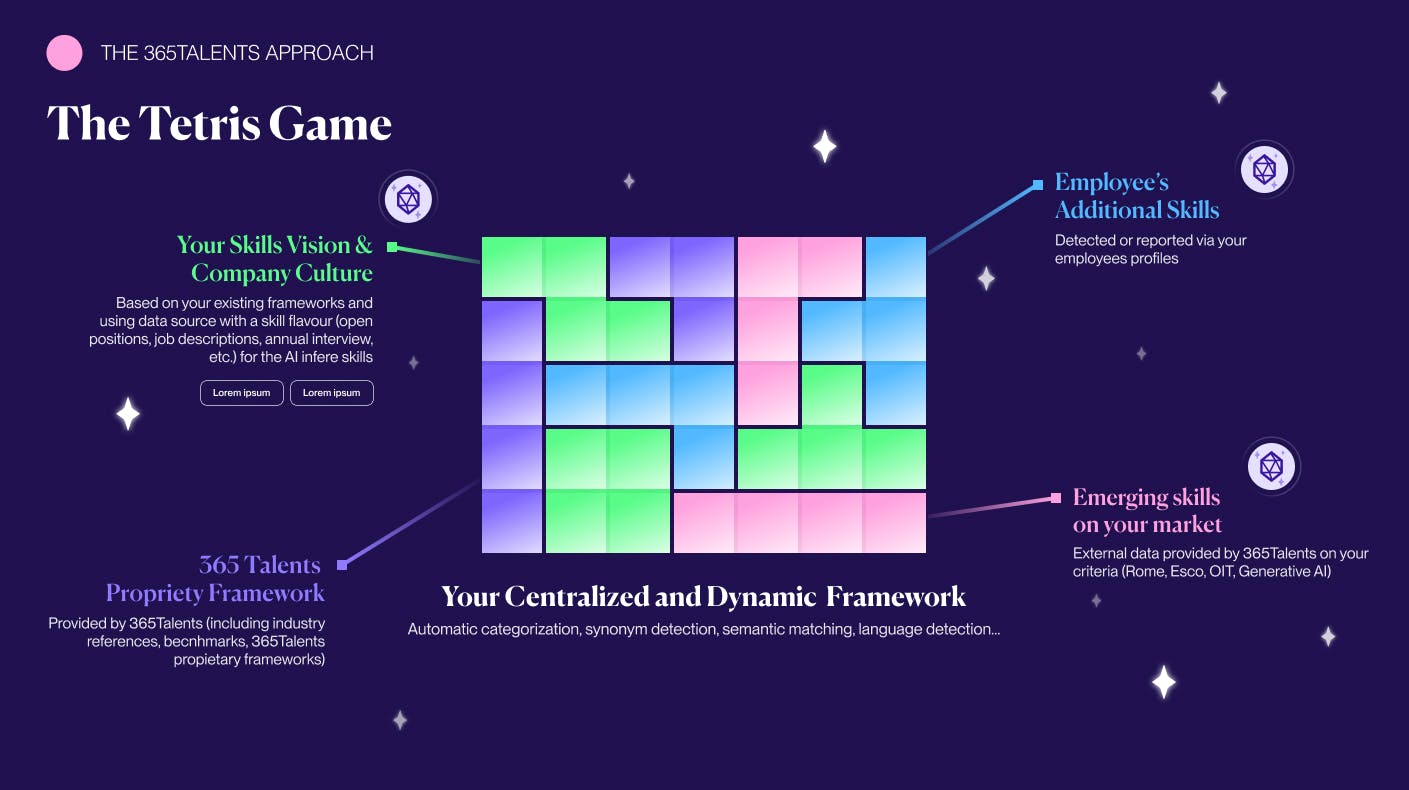Everything you need to know about skills management

Skills management is an essential strategic approach for modern skills-based organizations putting their people at the heart of HR. It focuses on identifying, developing, assessing and implementing the skills needed to achieve organizational and individual objectives.
This practice maximizes employees' potential while strengthening the company's overall competitiveness.
In this article, we'll explore the definition, key objectives and strategies for effective skills management.
What is skills management?
Skills management is a process that aims to identify, assess, develop and align employee skills with corporate objectives.
It goes beyond the simple assessment of qualifications and experience, and includes people's behavioral, technical and interpersonal skills. The ultimate aim is to ensure visibility, in turn ensuring that every employee has the skills required to successfully accomplish the tasks assigned to them, in line with the company's overall strategy.
Objectives of skills management
Skills management is based on knowledge of all the company's skills. This includes:
- Knowledge: Your employees all have knowledge. This is the theoretical knowledge acquired by an employee through education or training. It forms the basis for developing technical skills.
- Hard skills: Throughout their career, employees acquire technical skills, or hard skills. These are all the skills needed to do a job, or professional practice.
- Soft skills: Soft skills are related person's overall behavior and refer to how the interact with colleagues, solve problems and manage work.
Knowing your people's skills enables organizations to meet specific objectives, including:
- Evaluating skills: A company that wants to put its employees first must value them. To do so, it needs to help them develop and adapt to the ever-changing job market. Skills assessment is therefore crucial to identifying the level of expertise within each employee, and enabling them to play an active role in their professional development and progression.
- Anticipating skills needs: By assessing and analyzing current skills, you can compare them with those prevalent in the market and reduce skills gaps. By anticipating future needs, the company can prepare for market and technological changes, ensuring greater agility in the face of future challenges and anticipating future gaps.
- Optimizing individual and collective performance: By assessing and enhancing the skills of each employee, the company can improve the overall performance of its teams. A better match between the skills of each individual and the tasks to be accomplished promotes greater productivity and a higher quality of work. Of course, if your teams perform better, the company's overall results will only improve.
- Strengthening employee engagement and motivation: When employees see that their skills are valued and that they receive opportunities for professional development, their engagement and motivation are strengthened. This leads to higher retention of talent within the company.
- Facilitating talent management: Talent management helps to identify potential talent and develop them with a view to preparing them for higher leadership and responsibility roles within the organization. It is therefore an indispensable aid to facilitating, improving and optimizing your talent management strategy.
- Strengthening your employer brand: A company that invests in developing the skills of its employees attracts more talent and strengthens its reputation as an attractive employer. What more could you want for future recruitment?
What are the benefits of skills management?

Skills management offers benefits for the whole company. By whole company, of course, we mean your employees, your management and your HR department.
More precisely, skills management enables HR to:
- Optimize recruitment
- Staff projects precisely
- Define training needs in order to offer appropriate training to the right candidates
- Evaluate the level of expertise of your teams in order to stay up to date with the expected level of the market and not fall behind the competition
- Propose adapted remuneration and compensation policy
- Monitor and track development of critical skills
Globally, for the company this means:
- Improved talent management
- Improved collaborative learning and collective intelligence
- Happier employees
- Happier leadership
Let’s dive into these benefits in detail.
Improved talent management
This includes both talent identification and talent retention.
Effective talent management enables you to identify internal or external talent that will perform to improve results. You'll be able to find the right skills for existing internal positions, as well as develop the existing or new skills of loyal employees.
It also allows you to offer appropriate training and professional developmenttraining and professional development to each of your employees. An employee who has opportunities for advancement will be more motivated and committed, which in turn will increase their loyalty. And that's no mean feat in today's war for talent!
Improved collaborative learning and collective intelligence
Skills management is a way of exchanging skills between peers. New talents have much to contribute, just as existing employees can train them. This sharing and collaboration enables collective learning and cultivates collective intelligence and communities of experts.
Happier employees
Your employees feel valued, which will motivate them in their work. They can showcase their abilities, develop their skills and enhance their employability.
They are naturally more fulfilled when they feel listened to, put forward and more competent.
Happier leadership
For a company, the use of these talents and skills must be in line with its strategic objectives. Optimized skills management therefore makes it possible to:
- Reduce recruitment costs
- Give visibility to the company's talents
- Promote flexibility and adaptation
- Strengthen collective intelligence
- Stay ahead of the competition
Skills management is an essential component of modern, agile human resources management. By investing in the skills development of its employees, a company can improve its overall performance, strengthen its competitive edge and create a culture of continuous learning.
With the right skills management strategy in place, a company can attract, retain and develop the talent needed to succeed in an ever-changing business environment.
Ready to discover a more efficient and effective skills management methodology? Reach out to the 365Talents team today and chart a new course for people at work.
How we build your skills ontology and framework: The Tetris game
365Talents helps you to create a unique, accurate, and concise skills framework that aligns with your organization's specific skills context and culture. The framework is designed to be accurate, tailored to the specific abilities of your employees, and constantly updated to meet HR use cases and stay in sync with the latest trends. It is also designed to be dynamic, operating seamlessly within the flow of work, making it an invaluable tool for HR professionals. Most importantly, skills data should be accessible to all other HR processes and systems, serving as a common language for Talent Management and Talent Experience.
To achieve these objectives effectively, we use both top-down and bottom-up approaches to help you build a specific skills framework. Imagine your skills framework like a Tetris game board.
Your framework is a fusion of various sources that, through smart and strategic interpretation and manipulation, can be fit together for a seamless, rock-solid view of your company’s current skills.
No matter the shape, size or quantity of the skills data you currently have, we can integrate additional data or complement it with our existing frameworks, filling in any gaps you might have and mirroring your historical approach.
Once everything is live, you have your centralized and dynamic skills framework. Our technology takes over, performing automatic categorization, synonym detection, semantic matching, language detection, and automatic translation.



Discover 365Talents' Skills Management Guide
Read on and discover the power of skills management and how 365Talents can empower your organization to reach success.

Learn more about what you can do with skills









